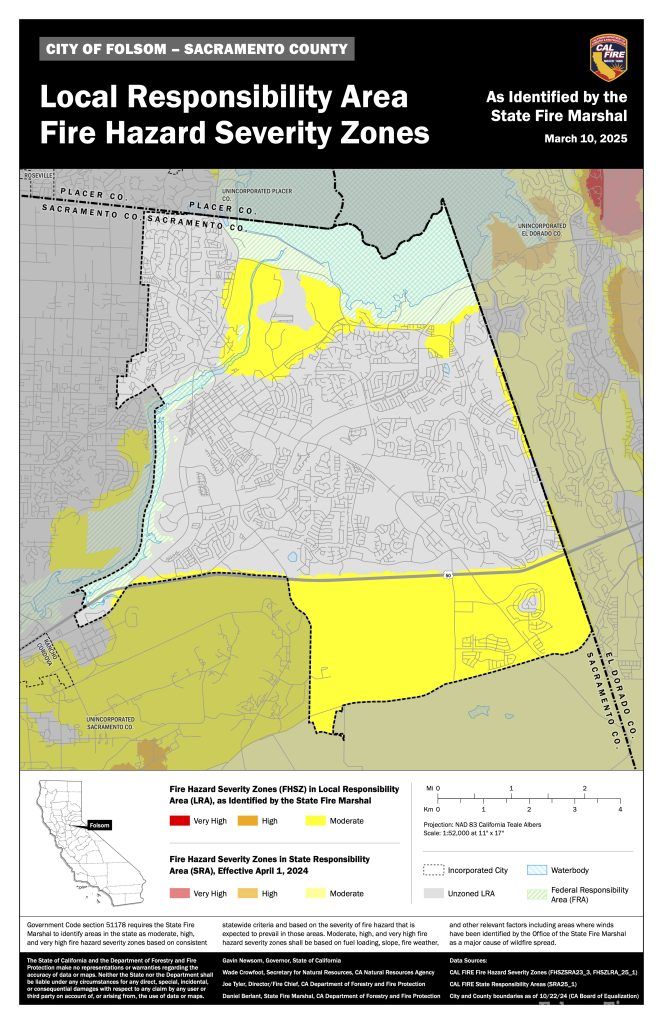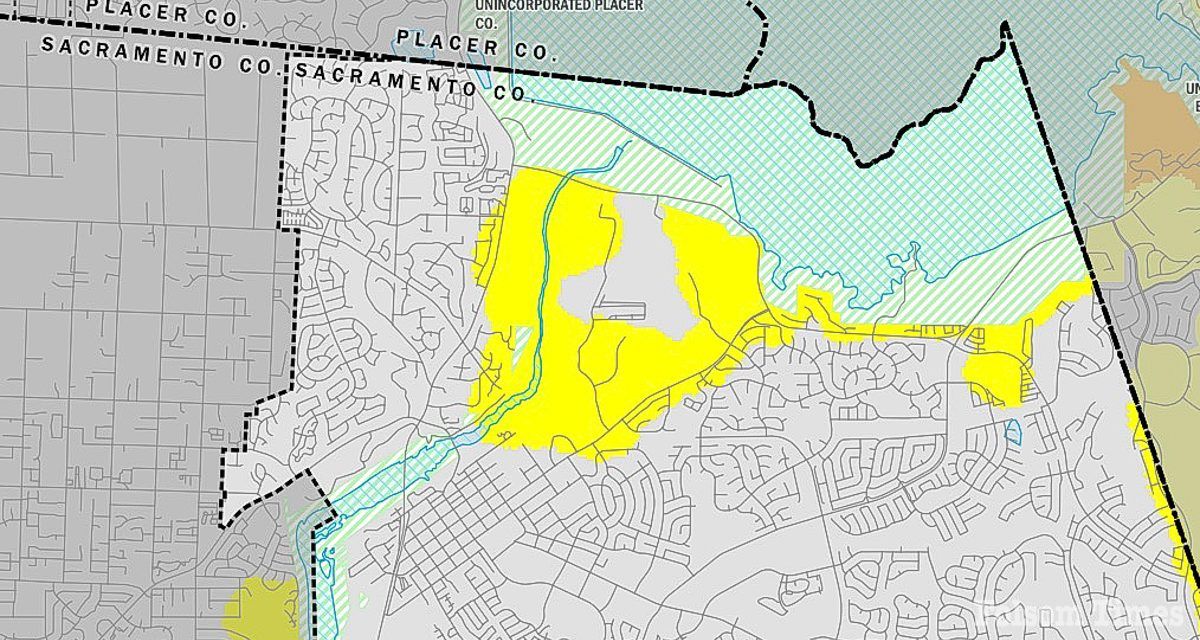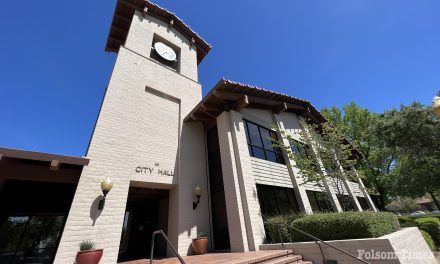Contract will cover 20 open-space sites across city
FOLSOM — The Folsom City Council approved a resolution Tuesday evening, authorizing City Manager Bryan Whitemyer to execute an agreement with Capra Environmental Services for shaded fuel break creation and ladder fuel removal across multiple city-owned open-space parcels. The $213,336.50 contract represents the third and final phase of a multi-year wildfire prevention initiative aimed at reducing vegetation hazards and establishing defensible space around neighborhoods citywide.
Funding for the project will come from a mix of sources, including the General Fund and several landscape and lighting and community facility districts such as Los Cerros, Prairie Oaks Ranch No. 2, Broadstone Units 1 through 3, and Natoma Station. The initiative is part of the city’s broader approach to wildfire mitigation, balancing public safety and environmental stewardship.
Parks and Recreation Director Kelly Gonzalez, who authored the staff report, said the program continues the city’s progress toward comprehensive fire prevention management rather than annual reactive maintenance. “While the City of Folsom has historically focused on annual weed abatement, we have not previously implemented a systematic program to address ladder fuels and to establish strategic defensible space between developed parcels and wildland areas,” Gonzalez wrote. “Once completed, there will be a defined separation between our developed and wildland areas.”
Folsom manages approximately 1,100 acres of open space throughout 70 sites, with 335 acres identified as containing “ladder fuels”—low growth vegetation capable of carrying flames into tree canopies. This final phase of the shaded fuel break program covers roughly 142.7 acres that remain unfinished after two previous contractors were unable to complete their work.
BrightView Tree Care Services was first awarded the project in 2022 but completed only 58 acres before terminating its contract. Loggers Unlimited, Inc. followed in 2023, clearing another 159 acres before ending its agreement. Capra Environmental Services will now take over the remaining acreage, marking the conclusion of the city’s three-year wildfire mitigation effort.
According to the city’s project tables, work will take place across 20 key open-space corridors throughout the city, including:
- BT Collins Park open spaces west of the park
- Willow Hill Reservoir and surrounding open spaces
- Humbug Creek from Riley to Cummings Park
- Dos Coyotes Trail Area
- Willow Creek from Riley to East Bidwell
- Natoma, Briggs Ranch, and Folsom Lake Crossing
- Parkshore outer limits and the JPA trail from Blue Ravine to Natoma Station Drive
- Portions of Broadstone, Natoma Station, and Empire Ranch
Site costs vary depending on terrain and density, with the Humbug Creek corridor representing one of the largest at more than $43,000 in work.
A request for proposals issued on May 20, 2025, drew four qualified bidders. Capra Environmental Services submitted the lowest bid at $213,336.50, compared to West Coast Arborists ($467,865), Fair Oaks Arborist ($513,720), and Greentek ($777,615). After scoring and interviews conducted on June 19, the city’s review team determined Capra to be the most qualified firm, citing its experience, cost efficiency, and readiness to complete work within schedule. The average proposal cost of $493,134 highlights the competitiveness of Capra’s bid. “Capra Environmental Services demonstrated they were the most qualified based on the advertised scoring criteria and interview,” Gonzalez noted.
The city is also seeking reimbursement through the Federal Emergency Management Agency (FEMA) and California Office of Emergency Services (CalOES). If a pending grant budget increase is approved, those agencies will reimburse up to 75 percent of the cost, reducing the city’s total contribution from $70,530 to $53,334. “The annual, more routine, work will focus more on the abatement of annual grasses and the maintenance of established fuel breaks,” Gonzalez noted in her report. “This will create lasting separation between our developed and wildland areas.”
During Tuesday’s meeting, Vice Mayor Justin Raithel voiced concern about the growing cost of state-imposed requirements that impact local budgets and the broader affordability of housing across California. While his remarks were tied to a separate building code item later in the meeting, Raithel emphasized a theme echoed by several councilmembers throughout the evening — balancing public safety measures with affordability and common-sense governance.
“I don’t know if anyone’s realized, but housing has gotten really, really expensive,” Raithel said. “I’m tempted to vote against this just to say that this is crazy — we’re making houses more and more expensive, and at the same time, we’re all talking about an affordability crisis.”
Raithel went on to note that while the council is bound by state mandates, he appreciates staff efforts to adapt local codes to be more practical and consistent with surrounding jurisdictions. “Our state legislature is talking about being in an affordability crisis and a housing crisis, and yet every three years, we make it harder and harder to build housing in this state,” he said. “If there was any control from the local level of this, we would roll these back… There are a lot of things in these codes which are driving up the cost of housing, and I would just love to see things pause for a few years while we catch up.”
While Raithel ultimately supported the city’s staff recommendations on both the building code and wildfire management measures, his comments underscored the ongoing tension between safety regulations, fiscal constraints, and affordability in local governance.
With the resolution approved, Capra Environmental Services will begin work this winter, with completion anticipated by March 16, 2026. The project will establish a citywide network of defensible space zones intended to protect both neighborhoods and open-space ecosystems as Folsom continues to face longer, hotter fire seasons.
“By maintaining shaded fuel breaks and managing our open space strategically, we’re not only protecting property but also enhancing the overall health of our natural landscapes,” Gonzalez added.

Copyright © 2025, Folsom Times, a digital product of All Town Media LLC. All rights reserved. No portion of this publication may be reproduced, distributed, or transmitted in any form or by any means, without the prior written permission of the publisher.




